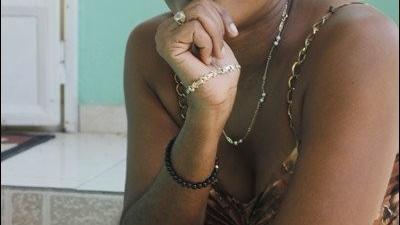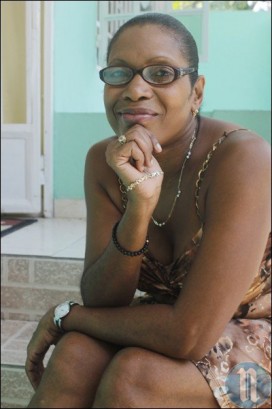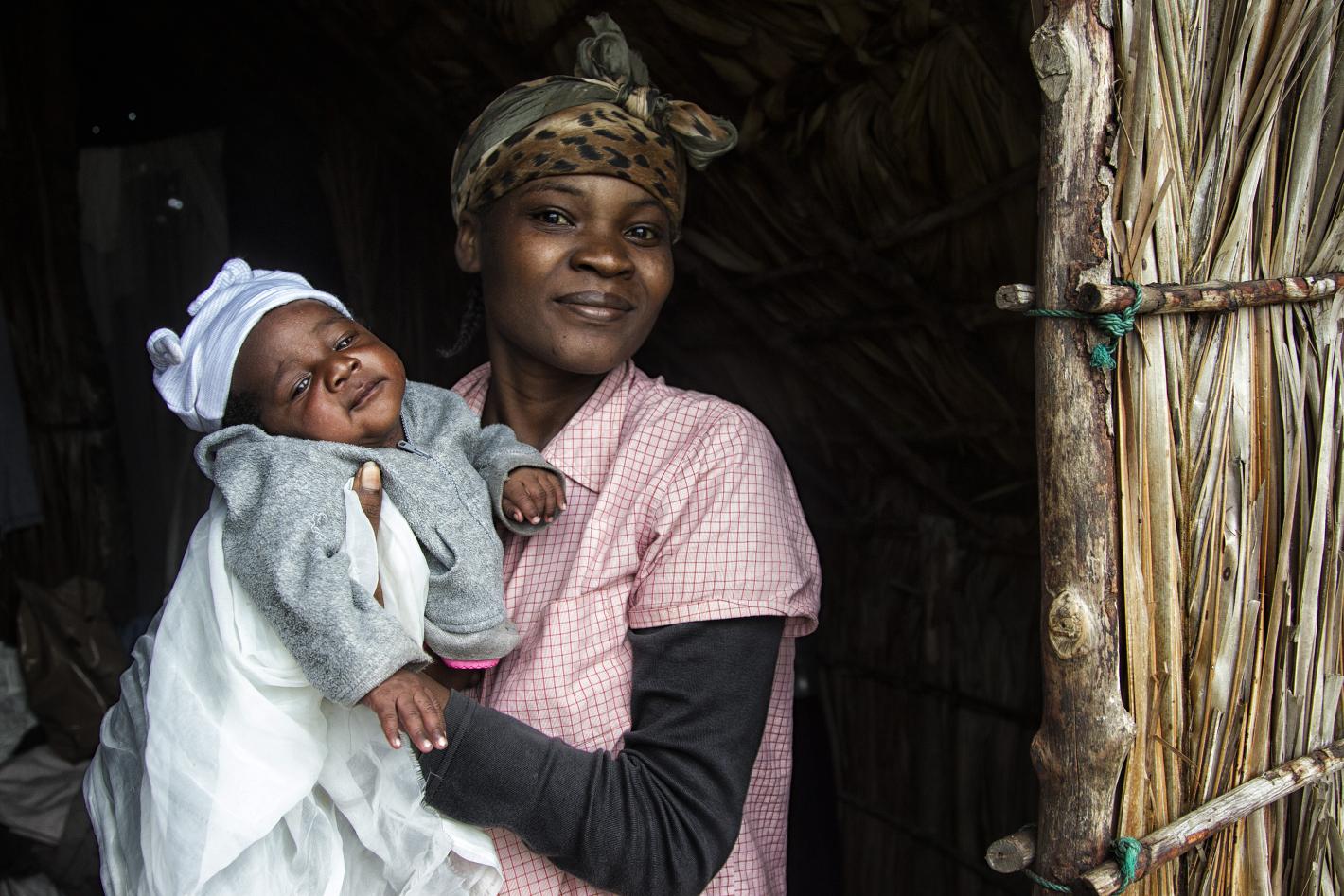Joëlle Donatien is one of the pioneers of modern dance in Haiti. She has devoted her life to a passion for dance and hopes to pass-on this passion to younger generations, even if the art does not attract much support in a Haiti beset by poverty.
With a deep, mellifluous voice, Joëlle Donatien is 55 years old, but you'd give her a good 20 years less, as she retains the strength and agility of youth.
Her secret: she dances regularly and says she wants to do so until the end of her days.
The vocation of this teacher started early – at the tender age of 13: "When I was at school with the nuns, I loved to see people dancr, and I, myself, loved to dance," she says. But Joëlle quickly ran-up against the reluctance of her parents who were not ready to see their little girl practicing this art which, to their eyes, seemed "disrespectful " of the female body with its sweeping gestures and the necessary iron discipline.
In 1972, with considerable perseverance, she joined the dance school of the famous Haitian choreographer Viviane Gauthier. "There I learned to dance, beginning with the folkloric dances of Haiti, then classical ballet, and jazz - before becoming a dance instructor myself," she explains.
Joëlle became swiftly known by the Haitian and American public through her obvious passion and perfect control. She was invited to take part in seminars and performances in Haiti and abroad, including New York in 1983 where she worked alongside dance teachers from around the world.
At the end of high school, she made the difficult choice to either continue to university or become a choreographer. Dance resonated loudest in her head. Helped by one of her aunts, who was sensitive to her passion, Joëlle founded, in 1979, her own dance school while just 19-years-of age. Since then, she has trained literally hundreds of young dancers and organized major shows.
"Dance is like breathing "
Joëlle's life choice has never disappointed. She literally lives to dance. "In all things, I see choreography. When I hear music, when I see the leaves rustling, birds flying en-mass, I see choreography," she explains - before adding that "Dance is life, like breathing ".
More than just a hobby, dance for her is a sport, an education – a therapy. "Dance brings much to the development of a child. And allows adults to be healthy through the physical effort it requires. It develops breathing, gives balance and physical elegance, fights shyness and laziness," she ays.
But Joëlle suffers from the fact that, despite bringing such personal satisfaction, dance is not a career choice for many young people. "Arriving at the time to chose a graduate school, my pupils are liable to stop everything. As a practitioner, "I ask those who have learned to dance, not to stop! Viviane Gauthier taught me to dance when she was 95 years-old, and to this day she continues to dance," says Joëlle with admiration. Joëlle herself hopes to continue just like her mentor, the grande dame of Haitian dance.
African-Haitian
Beginning her career with Haitian folkloric dance, Joëlle Donatien could not escape the charm and influence of African culture; it is a continent to where she traces the origins of dance. "The presence of the drum, percussion, lively movement... all this is Africa," she says, citing a litany of dances that come from the Congo or the former Dahomey.
Inspired by Lavinia Williams, a dancer of American origin known for her choreographic interpretation of Haitian Vodou, she explores the rich folklore of Haiti, as well as of Africa. Her original choreography of 'Sarafina', inspired by the Zulu dances of South Africa, impressed everyone (including dare we say it, the lwa) during its presentation in Port-au-Prince in July 2013.
With one foot in Haiti, and one in Africa, she carries the Dark Continent in her soul. She cites Nelson Mandela, as her absolute idol, as a fundamental source of inspiration and reflection: "Mandela spent 27 years of his life wrongfully imprisoned - but forgave his tormentors. This is a good lesson for politicians – African or Haitian" she says.
Antoine Adoum GOULGUEJoëlle Donatien est l’une des pionnières de la danse moderne en Haïti. Divorcée après 11 ans de mariage, elle consacre sa vie à sa passion et veut la transmettre aux jeunes générations, même si cet art n’attire pas les capitaux dans une Haïti en proie à la pauvreté.
La voix grave, Joëlle Donatien est âgée de 55 ans, mais on lui en donnerait 20, tant elle conserve la vigueur et l’agilité de sa jeunesse. Son secret : elle danse régulièrement et dit vouloir le faire jusqu’à la fin de ses jours.
La vocation de ce professeur de danse commence tôt, à 13 ans. « Quand j’étais à l’école chez les sœurs, j’aimais voir les gens danser, j’aimais danser », confie-elle. Mais elle se heurte vite à l’hésitation de ses parents qui n’étaient pas prêts à voir leur fille pratiquer cet art à leurs yeux « irrespectueux » du corps de la femme par les gestes amples et la discipline de fer qu’elle impose.
Mais en 1972, à force de persévérance, elle intègre l’école de danse de la célèbre chorégraphe haïtienne Viviane Gauthier. « Là, j’ai appris à danser, en commençant par le folklore puis le ballet classique, le jazz avant devenir moi-même monitrice de danse », explique-t-elle.
Joëlle se fait très vite connaitre du public haïtien et américain à force de passion et de maîtrise. Elle est invitée à prendre part à des séminaires et des spectacles en Haïti et à l’étranger, notamment à New York en 1983 où elle côtoie des professeurs de danse du monde entier.
A la fin de ses études secondaires, elle doit faire le choix difficile de poursuivre en université ou devenir chorégraphe. La danse résonne toujours plus fort dans sa tête. Aidée par une de ses tantes, sensible à sa passion, elle fonde en 1979 sa propre école de danse alors seulement âgée de 19 ans. Depuis lors, elle a formé des centaines de danseuses et danseurs et organisé de grands spectacles.
« La danse, c’est comme respirer »
Son choix ne l’a jamais déçue. Elle vit pour la danse. « En toute chose, je vois une chorégraphie. Quand j’entends une musique, quand je vois les feuilles bouger, les oiseaux voler en bande, j’en tire une chorégraphie », explique Joëlle Donatien avant de lâcher : « la danse c’est la vie, c’est comme respirer ».
Plus qu’un loisir, la danse est pour elle un sport, une éducation et une thérapie. « Elle apporte beaucoup au développement de l’enfant. Et permet à l’adulte d’être en bonne santé par les efforts physiques qu’elle exige. Elle développe la respiration, donne l’équilibre et l’élégance physique, combat la timidité et la paresse», vante-t-elle avec force détails.
Mais elle souffre du fait que, malgré cette richesse, la danse ne soit pas le choix de beaucoup de jeunes. « Arrivé le moment de faire les études supérieures, ils arrêtent tout. D’où son conseil de praticienne : « Je demande à ceux qui ont appris à danser de ne pas arrêter. Viviane Gauthier m’a appris à danser à 95 ans, mais elle continue de danser », dit-elle avec admiration. Et elle compte bien faire comme cette grande dame de la danse haïtienne.
Africaine haïtienne
En commençant sa carrière par le folklore haïtien, Joëlle Donatien ne pouvait échapper au charme de la culture africaine, un continent où elle situe ses origines. « La présence du tambour, de la percussion, la vivacité des mouvements… tout ça c’est africain », explique-t-elle en citant une kyrielle de danses venues du Congo ou de l’ancien Dahomey.
Inspirée par Lavinia Williams, Américaine d’origine connue pour son interprétation chorégraphique du Vodou haïtien, elle explore la richesse du folklore d’Haïti comme celui d’Afrique. Sa chorégraphie originale du Sarafina, tirée de la danse Zoulou d’Afrique du Sud, avait marqué les esprits lors de sa présentation à Port-au-Prince en juillet 2013.
Un pied en Haïti, l’autre en Afrique, elle porte le continent noir dans son âme. Et cite Nelson Mandela, son idole absolue, comme une source fondamentale d’inspiration et de réflexion. « Il a passé injustement 27 ans de sa vie en prison mais a pardonné à ses bourreaux. C’est une bonne leçon pour les hommes politiques - africains ou haïtiens ».
Antoine Adoum GOULGUE
- Accueil
- Actualités
- Joëlle Donatien : dancing is living ! Joëlle Donatien : Danser c’est vivre
Joëlle Donatien : dancing is living ! Joëlle Donatien : Danser c’est vivre
- 14 mars 2014
- Actualités





